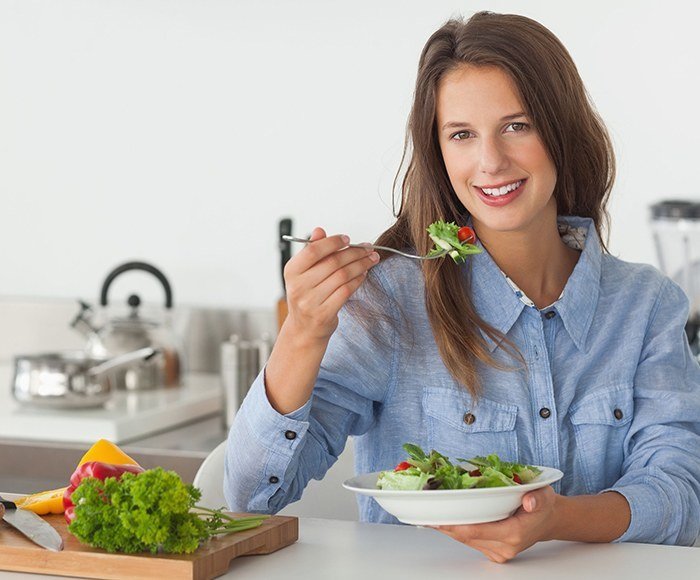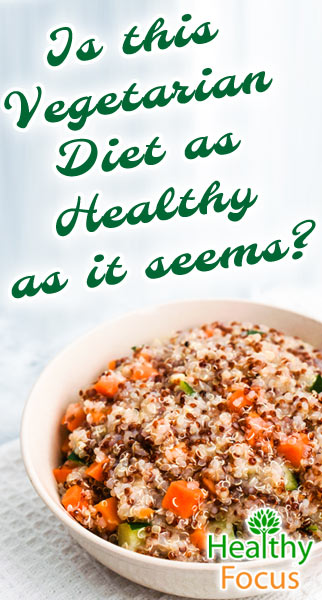Last Updated on December 11, 2016 by Marc Seward
When it comes to the vegetarian diet, there are a few things you may not know. One: there are several different ways you can be a vegetarian. Two: When most people say they are a vegetarian, they are usually a lacto ovo vegetarian.
So what’s a lacto ovo vegetarian and what are the differences between other variations of the vegetarian diet?
A lacto ovo vegetarian diet mainly consists of vegetables, fruit, grains, legumes, nuts, seeds, eggs, and dairy products. A pescetarian excludes meat and poultry from their diet but still includes fish. An ovo vegetarian includes eggs in their diet but will not consume dairy. A lacto vegetarian includes dairy but will exclude eggs. A vegan diet avoids all animal products such as dairy, eggs, beeswax, and honey.
Why People Pursue a Lacto Ovo Vegetarian Diet
A vegetarian diet is highly individual. People have varying degrees of strictness to their diet and reasons as to why they pursue a vegetarian lifestyle. Often, people find the health benefits of a lacto ovo vegetarian lifestyle as a big motivator for making a jump into practicing the diet. While some may practice the diet for their health, they may do it for ethical reasons as well.
Many people do not feel comfortable that animals should be killed for their meals and will therefore abstain from eating meat. Others may be questioning the quality of meat they get from the grocery store, uncertain if eating it is safe. Meat brings risks of salmonella and animal borne illnesses such as avian flu and mad cow disease. Some people choose to reduce their risk by eliminating meat altogether from their diet.
Another reason people may become a lacto ovo vegetarian is because of their religion. Religions such as Jainism and Hinduism practice a vegetarian lifestyle. Some Christians will consider a vegetarian lifestyle and give up eating meat for Lent.
Benefits of a Lacto Ovo Vegetarian Diet
A lot of people look into being a lacto ovo vegetarian because of all the health benefits it has to offer. When planned well, a lacto ovo vegetarian diet is one of the healthiest diets you can achieve. Many people believe that practicing this diet not only helps to ensure a long and healthy life, but also increases the overall quality of it as well.
Illness: If you have ever been the victim of food poisoning, you know just how demoralizing and miserable it can be. Cutting meat out of your diet greatly decreases your risk of contracting animal born illnesses such as salmonella and E. Coli.
There are more than 200 types of infections and many of them are the result of the crowded and poor conditions of animal-processing facilities. For example, most farmers lace their chicken feed with arsenic as a means to get rid of parasites. This means that people consuming these chickens are also consuming arsenic, which can build up in the bloodstream possibly causing long-term and short-term ailments.
Consuming fish also poses a threat to your health. Fish (especially farmed) accumulate mercury in their bodies, posing an especially high risk to pregnant women and children. Unfortunately, these are only a few examples of ways consuming meat can make you sick and it is for this reason many people may consider taking up a lacto ovo vegetarian diet.
Cancer: Studies have found that adopting a lacto ovo vegetarian diet can greatly reduce your risk of developing many types of cancer. Eating vegetarian can cut potential cancer rates down by as high as 25 to 50 percent. These cancers include: colon, prostate, stomach, esophagus cancer, as well as lymphoma (cancer of the lymphatic system).
Heart Disease: Currently, as things stand, heart disease is the number one killer of men and women in the United States. By eliminating meat from your diet, you greatly cut down on your intake of cholesterol, which is poses one of the biggest risks to your heart’s health. The increased amount of fiber you can get from a vegetarian diet helps to eliminate the excess cholesterol in your digestive track.
Some Considerations
- If not planned accordingly, some lacto ovo vegetarians run the risk of not getting enough protein, iron, zinc, and omega-3 fats. However, there are steps you can take to make sure you are enjoying a balanced diet by getting all of the nutrients you need. If you are pregnant or breast-feeding, it is important to discuss all dietary choices with your healthcare provider.
- Protein: Getting enough protein is essential to the muscle and red blood cell health of your body. You can make sure to get enough protein by incorporating the following into your diet:
soy, soy milk, tofu, tempeh, veggie burgers, dried beans (black, white, kidney), peas (black-eyed peas and chickpeas), lentils, grains (quinoa, rice, oatmeal, bulgur), nuts, nut butters (almond and hazelnut), peanuts, peanut butter, and dairy products such as milk, yogurt, cheese, and eggs. - Iron: We need iron to carry oxygen to different parts of our body. Vegetarians need to be especially diligent about doubling the amount of iron they eat because iron derived from plants do not absorb as well as iron from animal-based foods.To make sure you are getting enough iron, good sources of iron are: soy, tofu, tempeh, veggie burgers, dried beans, lentils, peas, fortified foods (cereals, bread, pasta), nuts (cashews and almonds), seeds (pumpkin and sesame), dried apricots, prune juice, vegetables cooked with their skins (spinach, kale, potatoes), and black strap molasses.
- You can increase your chances of absorbing vegetarian-friendly iron by pairing it with vitamin-C rich foods:
green leafy vegetables, sweet peppers, broccoli, snow peas, lemons, limes, mangos, kiwis, cantaloupe, oranges, orange juice, grapefruit, and grapefruit juice. - Zinc: To maintain a healthy immune system, zinc is essential. Zinc also helps to heal wounds and aids in growth and development. You can get zinc from:
soy, soy milk, tofu, dried beans, peas, lentils, nuts (pecans and cashews), cashew butter, peanuts, peanut butter, pumpkin seeds, tahini, whole grains, and fortified cereals. - Omega-3 fat: Omega-3 fats are responsible for eye health and preventing heart disease. They also help out with nerve and brain development. To make sure you’re getting an adequate amount of omega-3 fats into your diet, you should consume:
oils (canola, flaxseed, walnut, soybean), ground flaxseed, soybeans, tofu, and walnuts. - B-12 vitamins, calcium, and vitamin D: If following a healthy diet, lacto ovo vegetarians typically get enough calcium, vitamin D and B-12 vitamins from consuming eggs and dairy products.
How to Become a Lacto Ovo Vegetarian
If adopting a lacto ovo vegetarian diet is something your want to consider, there are several steps you can take to ease yourself into the diet:
- Educate yourself on the diet to make sure it is the most suitable choice for your health and lifestyle.
- Do your research. Its important to know that there is a difference between animal products and animal-based products. An example of an animal-based product is gelatin (made up of animal bones and hooves), which is found in gelatin deserts, most gummy candies, and marshmallows. Some vegetarians are a little bit more lax about this, so how strict you want to be with this diet is entirely up to you.
- Discuss with your physician or health care provider to help you come up with the safest plan of action when pursuing a lacto ovo vegetarian diet.
- Make sure you are consuming all the necessary nutrients, such as calcium, iron (remember to double your intake), protein, zinc, B-12 vitamins, vitamin D, and omega-3 fats.
- If you find incorporating all the above nutrients into your diet difficult, consider taking dietary supplements in order to remain healthy.
Fortunately, many people are recognizing the benefits of a lacto ovo vegetarian diet and as a result, more and more restaurants are offering vegetarian friendly options. Now that vegetarian diets are hitting the mainstream, easing into the diet is much more easier than it used to be.


Leave a Reply
You must be logged in to post a comment.